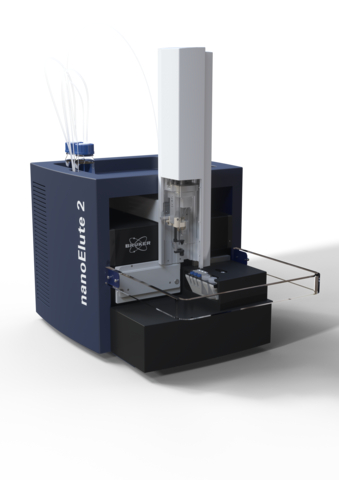- New nanoElute 2 features nano-LC advances, supports automated single cell sample preparation from label-free ProteoCHIP on CellenONE platform
- MetaboScape® 2023 advances fluxomics applications and ion mobility offset mass aligned (‘MOMA’) events for high-throughput 4D-Metabolomics
- Advances in MALDI HiPLEX-IHC™ workflows, and in PaSER™ on-the-fly intelligent acquisition software for 4D-Metaproteomics
At the International Mass Spectrometry Conference (IMSC 2022), Bruker Corporation (Nasdaq: BRKR) today announced the launch of the new nanoElute® 2 nano-LC, of MetaboScape® and TASQ® 2023 software supporting fluxomics, and of latest advances in PaSER™’s intelligent acquisition to enhance research in protein-protein interactions (PPIs) and metaproteomics applications.
This press release features multimedia. View the full release here: https://www.businesswire.com/news/home/20220829005210/en/

The nanoElute® 2, a high-performance nanoflow liquid chromatography system with an intuitive and flexible user interface, covering a broad range of applications from single cell to high throughput routine proteomics (Photo: Business Wire)
The next-generation nanoElute® 2 combines outstanding nano-LC chromatography performance with hardened high-pressure switching valves, and finger-tight torque-limiting capillaries for leak-free zero dead volume connections, without the risk of overtightening or damaging capillaries. The nanoElute 2 features a further improved nano-LC pump design, and an intuitive and flexible user interface covering a broad range of applications from single-cell proteomics to plasma proteomics. The nanoElute 2 now also supports the label-free ProteoCHIP® for the CellenONE platform for high-sensitivity single cell proteomics.
Dr. Henrik Johansson, Senior Scientist in Cancer Proteomics in the Department of Oncology-Pathology at the Karolinska Institute in Sweden, said: “The ‘dissolve’ workflow on the nanoElute 2 now perfectly supports our proteomics sample preparation done by the robotic platform in 96 or 384 well plates. The nanoElute 2 dissolves the tryptic peptides directly in the plate prior to injection, avoiding manual intervention and thus streamlining our workflows.”
The latest MetaboScape 2023 release provides streamlined collision cross section (CCS)-enabled metabolic profiling and annotation workflows covering 4D timsTOF data acquisition to highest confidence annotations for lipids and metabolites. New features include improved 4D peak detection and integration, accelerated processing, and smart merging of positive and negative ion data. Powerful automated prediction of CCS values from chemical structures in spectral libraries leverages the accurate CCS values measured on the timsTOF.
In addition, to support the metabolomics community focus on quality, MetaboScape 2023 now offers better means for data quality assessment in large scale studies, while TASQ 2023 extends target screening and quantitation by CCS-enabled MOMA events. Finally, refinements to stable isotope labeling methods simplify large-scale labeling experiments.
Professor Nils Faergeman, Department of Biochemistry and Molecular Biology at the University of Southern Denmark, commented: “The new TASQ fluxomics workflow streamlined our stable isotope labeling experiments on our timsTOF instrument. The integrated natural abundance correction and fractional enrichment calculations together with manual review capabilities enables us to generate results with high confidence for our small molecule isotope tracing studies.”
At IMSC, Buker also showcases the new MALDI HiPLEX-IHC workflow for multiplex imaging of protein targets. MALDI HiPLEX-IHC combines Bruker’s IntelliSlides® automated MALDI workflow with AmberGen’s Miralys antibody-based photocleavable mass tags for spatial localization of target proteins across tissue sections. Key advantages of the workflow include whole slide field-of-view and multiplexing capability of tens to over a hundred protein targets from FFPE or fresh frozen tissue sections, as well as multiomics capability to overlay metabolite, lipid and glycan mass spec images with protein targets from the same section.
Dr. Ron Heeren, Distinguished Professor and Limburg co-chair of the Maastricht Multimodal Molecular Imaging (M4I) Institute, added: “At M4I, we develop workflows and techniques to contextualize the role of individual cells in disease, and determine how interactions between cells affect cellular states locally and across long distances. MALDI HiPLEX-IHC provides a seamless platform for integrating protein expression information into the key projects that we are collaborating on with our experimental pathology team.”
At IMSC, Bruker also further advances its bioinformatics proteomics real-time search capabilities using PaSER™. Intelligent instrument control leveraging the 4th dimension of large-scale accurate CCS data promises significantly greater insights, from post-translational modifications of the epiproteome, to substoichiometric analytes in targeted approaches.
Dr. Mathieu Lavallée-Adam, Associate Professor at University of Ottawa and Ottawa Institute of Systems Biology in Ottawa, Canada, said: “We use machine learning, such as Bayesian inference, artificial neural networks and logistic regression classifiers, with large-scale proteomics data to derive biological knowledge about cellular mechanisms and disease processes. Biological samples are often sample-limited, thus requiring as much information to be extracted in single analyses now augmented with on-the-fly adjustments of mass spectrometry parameters. Bruker’s intelligent feedback control via PaSER allows us to rapidly prototype feedback-based bioinformatics modules to be used by the community. We are enthusiastic to collaborate with Bruker to further feedback-based intelligent acquisition for the study of protein-protein interactions and metaproteomics.”
About Bruker Corporation (Nasdaq: BRKR)
Bruker is enabling scientists to make breakthrough discoveries and develop new applications that improve the quality of human life. Bruker’s high performance scientific instruments and high value analytical and diagnostic solutions enable scientists to explore life and materials at molecular, cellular, and microscopic levels. In close cooperation with our customers, Bruker is enabling innovation, improved productivity, and customer success in life science molecular and cell biology research, in applied and pharma applications, in microscopy and nanoanalysis, as well as in industrial applications. Bruker offers differentiated, high-value life science and diagnostics systems and solutions in preclinical imaging, clinical phenomics research, proteomics and multiomics, spatial and single-cell biology, functional structural and condensate biology, as well as in clinical microbiology and molecular diagnostics. Please visit www.bruker.com.
View source version on businesswire.com: https://www.businesswire.com/news/home/20220829005210/en/
Contacts
Media
Petra Scheffer
Bruker Daltonics Marketing Communications
T: +49 (421) 2205-2843
E: petra.scheffer@bruker.com
Investor Relations
Justin Ward
Sr. Director Investor Relations & Corp Development
T: +1 (978) 663–3660, ext. 1479
E: Investor.Relations@bruker.com




